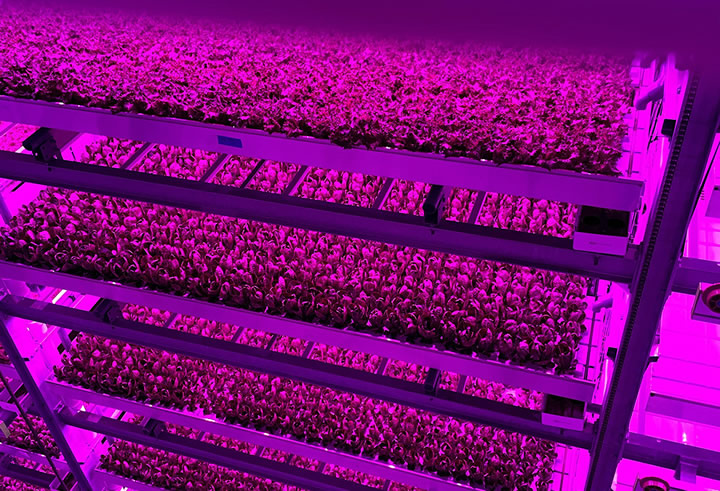Vertical Farming on the Rise: Arkansas Agricultural Experiment Station and 80 Acres Farms Enter Research Agreement

Vertical farming business 80 Acres Farms has entered into a collaborative research agreement with the Arkansas Agricultural Experiment Station to advance the science of vertical farming.
Scientists with the experiment station, the research arm of the University of Arkansas System Division of Agriculture, will coordinate with 80 Acres Farms researchers to pursue a variety of vertical farming research topics, said Bryan Renk, director of commercialization for the division's Technology Commercialization Office.
"Vertical farming is growing and trending," Renk said. "There are multiple companies forming across the U.S. that are trying to take advantage of that trend."
Jean-François Meullenet, senior associate vice president for agriculture research and director of the experiment station, said the agreement provides a unique opportunity for research.
"We are very excited about this new research partnership with 80 Acres Farms," Meullenet said. "Protected farming is a strategic research direction for the Arkansas Agricultural Experiment Station, and 80 Acres Farm is a leader in this area."
Renk said that the initial round of proposed and current research includes a project analyzing the chemical components of 80 Acres produce, an exploration into new protocols for vertical farming, and evaluation of novel blackberry variety selections that are suited for the vertical farming environment.
"We have a great multidisciplinary team of faculty that can make great contributions to the development of vertical farming technology," Meullenet said. "I look forward to seeing the impact we can have through this research."
"80 Acres is expanding its vertical farming R&D facility in Springdale, Arkansas to develop the growing recipes for multiple leafy and fruiting produce crops," said Victor Verlage, senior vice president for operations, agronomy, and research and development at 80 Acres Farms. "We are calibrating and aligning all the growing conditions, incorporating several proprietary AgTech capabilities that were not available until recently, to bring hyper-fresh fruits and vegetables loaded with taste and nutrition so our consumers can indulge in healthy diets," he said.
Margaret Worthington, assistant professor of fruit breeding and genetics in the horticulture department for the experiment station and Dale Bumpers College of Agricultural, Food and Life Sciences at the University of Arkansas, is evaluating blackberry varieties that may perform well in these novel growing conditions.
"We hope to identify blackberry breeding selections that perform well in fully-controlled indoor environments and vertical farms," Worthington said.
"Fruit breeding is a long-term effort," she said. "We need to be forward-thinking and consider how the potential varieties moving through our breeding pipeline are going to fit into new markets and productions systems that are just beginning to develop.
"The Arkansas Fruit Breeding Program has a history of mutually beneficial public-private research collaborations and I am looking forward to working with this new partner," she said.
In addition to collaborating on research, 80 Acres Farms also plans to create internship opportunities for Bumpers college students.
"80 Acres Farms is eager to provide opportunities for the next generation of farmers where they will have access to best-in-class vertical farming technology," said Verlage. "The students will have immersive training right here in Northwest Arkansas, minutes from the university campus."
To learn more about Division of Agriculture research, visit the Arkansas Agricultural Experiment Station website: https://aaes.uark.edu. Follow us on Twitter at @ArkAgResearch and Instagram at ArkAgResearch.
About the Division of Agriculture
The University of Arkansas System Division of Agriculture's mission is to strengthen agriculture, communities, and families by connecting trusted research to the adoption of best practices. Through the Agricultural Experiment Station and the Cooperative Extension Service, the Division of Agriculture conducts research and extension work within the nation's historic land grant education system.
The Division of Agriculture is one of 20 entities within the University of Arkansas System. It has offices in all 75 counties in Arkansas and faculty on five system campuses.
The University of Arkansas System Division of Agriculture offers all its Extension and Research programs and services without regard to race, color, sex, gender identity, sexual orientation, national origin, religion, age, disability, marital or veteran status, genetic information, or any other legally protected status, and is an Affirmative Action/Equal Opportunity Employer.
About 80 Acres Farms
80 Acres Farms is a vertical farming leader providing customers with the freshest and most nutritious fruits and vegetables at affordable prices. Utilizing world-class technology and analytics, the Company offers customers a wide variety of pesticide-free food with a longer shelf-life that exceeds the highest food safety standards.
Comments (0)
This post does not have any comments. Be the first to leave a comment below.
Featured Product

